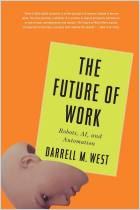Join getAbstract to access the summary!

Join getAbstract to access the summary!
Gary Pinkus, Tom Fanning, Penny Pritzker and Peter Orszag
Who’s Generating the New Jobs, and What Skills Will Workers Need?
Aspen Institute, 2017
What's inside?
Advancing technology demands a paradigm shift to lifelong learning.
Recommendation
Industry leaders Gary Pinkus and Tom Fanning join former US secretary of commerce Penny Pritzker and economist Peter Orszag to discuss how to gird the workforce for the digital age. Following the substantive, sometimes contentious panel discussion, a lengthy Q&A roams “far off topic,” as Pritzker notes in an aside to the other panelists. You may choose to skim the Q&A, but getAbstract advises giving the 25-minute panel your full attention.
Summary
About the Speakers
Gary Pinkus is a managing partner at consulting firm McKinsey & Company. Tom Fanning is CEO of the Southern Company, an energy producer. Penny Pritzker is the former US secretary of commerce. Economist Peter Orszag previously directed the US Budget Office.




























Comment on this summary